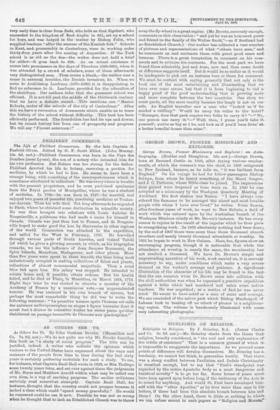PHILIBERT COMMERSON.
The Life of Philibert Oontmerson. By the late Captain S. Pasfield Oliver. Edited by G. F. Scott Elliot. (John Murray. 10e. 6d. net.)—Philibert Commerson was born in the Pays des Dombee (near Lyons), the son of a notary who intended him for his own profession. But Nature was too strong for the father. Philibert devoted his life to botany, reserving a portion for medicine, by which he had to live. He seems to have been a strange being, with something of the unscrupulousness which is sometimes attributed to collectors. Ho was everywhere in trouble with the peasant proprietors, and ho even purloined specimens from the Royal garden of Montpellier, where he was a student of medicine. In 1760—he was born in 1727—he married, and enjoyed two years of peaceful life, practising medicine at Toulon- sur-Arroux. Then his wife died. Not long afterwards he migrated to Paris, whore he obtained some distinction in scientific society. He was thus brought into relations with Louis Antoine de Bougainville, a politician who had made a name for himself in Canada. Canada was just then lost to France, and de Bougain- ville hoped to make good the loss by discoveries in other regions of the world. Commerson was attached to the expedition, and sailed for the West in February, 1767. He travelled through various parts of South America, and visited Tahiti (of which he gives a glowing account, in which, as his biographer remarks, we see the influence of Jean, Jacques Rousseau), the Spice Islands, Mauritius, Madagascar, and other places. More than five years were spent in these travels, the time being most industriously occupied in making collections of fishes and plants, collections of almost monumental magnitude. Then a cruel blow fell upon him. His salary was stopped. He intended to return home and, if possible, obtain redress. But his health failed, and he died at Flacq, in Mauritius, on March 13th, 1773. Eight days later ho was elected in absentia a member of the Academy of France by a unanimous vote,—an unprecedented honour. He was eminent in his own branch of science, but perhaps the most remarkable thing he did was to write the following sentence : "La premibre nuance aprbs l'homme est cella des animaux anthropomorphes ou singes h figure humaino dont il serait fort h clOsirer do connattre toutes les 'Aries payee qu'elles etablissent un passage insensible do l'hommo flux quadrupbdes."






















































 Previous page
Previous page